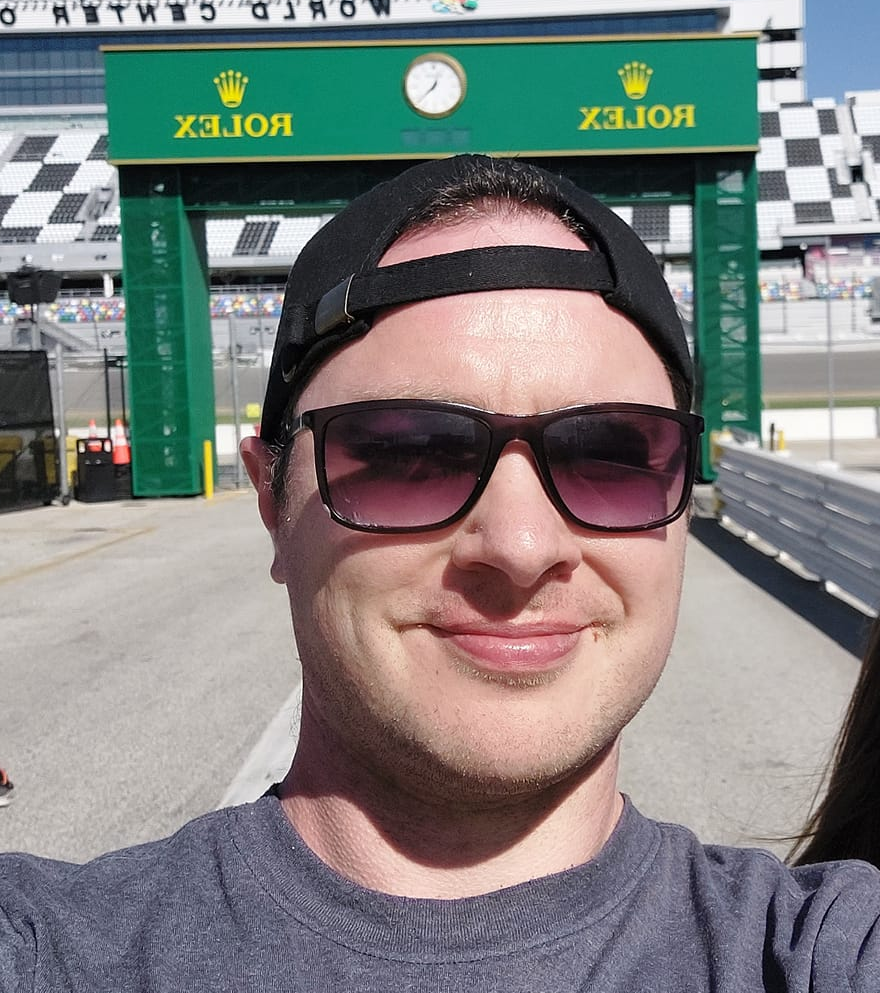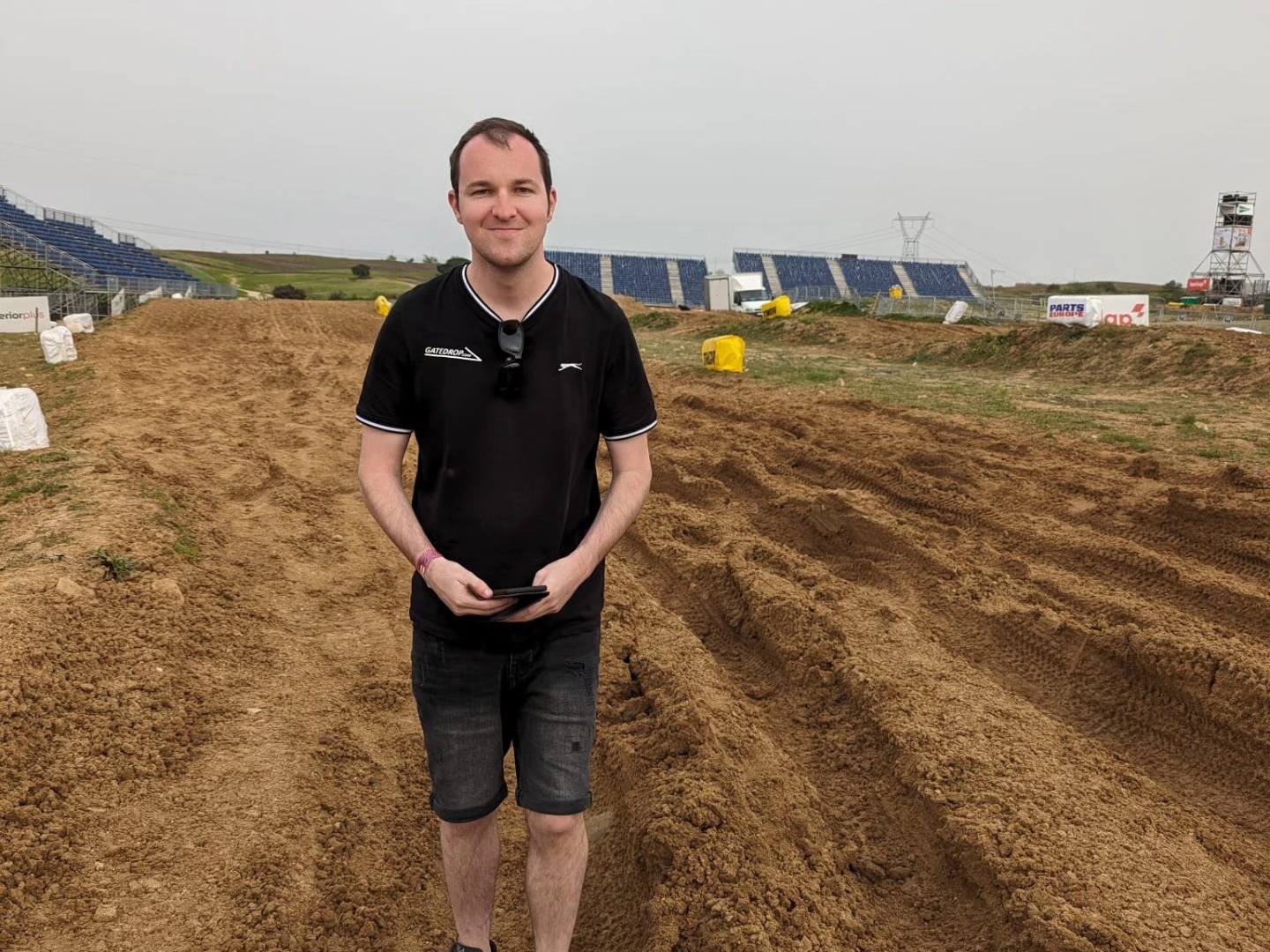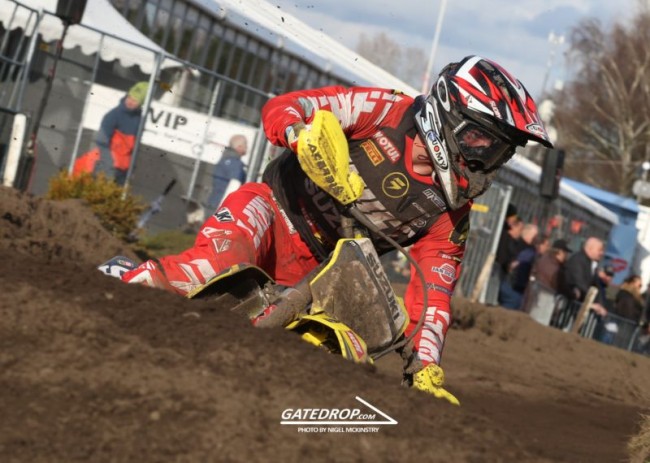Bas Vaessen was one talented rider but he didn’t exactly have much luck on his side. He suffered a serious injury in Indonesia back in 2019 where lost the feeling in his arms and legs for four minutes.
As if that wasn’t bad enough in 2021 when contesting a British Championship at Culham, he ended up in the intensive care unit breaking his vertebrae T8 to T11 and hit his neck again. Sadly, that was in the end of his Motocross racing career in what was a life changing injury.
Fast forward to 2024 and Vaessen is doing well and has made a good recovery. He attends Lommel GP every year to watch and was recently in Austria for a skiing trip.
Kevin Frelaud from DailyMX caught up with the Dutch talent to discuss a range of topics.
Bas, it is great to be able to catch up with you. Obviously, we know what happened to you in 2021, an unfortunate life changing accident after an already big injury the year prior. I’ve kept an eye on the recovery, and it’s a blessing to see how far you’ve come since that day. Can you talk about what you went through, physically, since that very day in Culham?
Vaessen: Physically so much has changed since then, short story long I went from being one of the fittest in the field to not being able to pick my nose to now have a manageable life. The first few months after my crash were brutal because then I had to totally rely on other people to take care of me as slowly my body was recovering. I think the first time I was kinda able to eat independently was about two months after the crash when I got enough control over my left hand and that was a huge achievement for me. Initially the doctors said that I would be lucky if I was even able to sit up on my own and now nearly three years later I just came back from a ski trip in Austria.
In every injury, there is a physical side and a mental side. We touched on the physical side, what did it take, mentally for you, to overcome this challenge?
Vaessen: Mentally, I may have only had once or twice a bad moment since that day. In dire situations your mind goes into survival mode and immediately when I was laying on the ground I was not feeling anything anymore and not able to move my legs and arms. In that moment my first thought was how can I make sure no one moves me until paramedics arrived and what the next move was. The only thing that was on my mind was how to improve the situation and that has not stopped. I think having been a dirt bike rider all my life and all the highs and lows of reaching world championship level has been the reason why my mind was so resilient and able to fight the paralysis to a certain extent.
As a professional racer, you’ve been formatted to perform, to strive for one goal since your early days; that’s basically all you’ve ever done, all you’ve ever known, and all you’ll ever do. When, in a blink of an eye, that goal gets taken away from you, how does one adapt to the switch to a more “normal” life, as “normal” as it can be in those circumstances; what’s Bas life like nowadays?
Vaessen: Now I’m a junior project leader in real estate development. It may not be racing but I still set goals all the time. Instead of shaving a tenth off per lap now it’s about making the process run as smoothly as possible. I try to make a new physical goal each year, last year I wanted to cycle a 100 km and this year I want to walk half a marathon. As my walking pace is a lot slower hopefully I can reach it in about 7.5-8 hours.
Has this incident changed your perspective on the sport, and on your life in general?
Vaessen: in some regards yes, I myself was way too focused on becoming the fittest rider that I lacked on some other areas like raw one lap speed and in generally more fun riding. Focusing too much on one area hinders others and now in housing development I try to have a more broader approach to work. I was training basically every day at least 5-7 hours on and off the bike. Instead I should have put more effort in either developing the bike or perfect my riding skills in general.
High level athletes have a different mindset than your average person. Not everybody wants to wake up and grind days in days out. Having that performance mindset well anchored over the years, did you feel it helped you during the recovery, aiming at new goals at life and always looking for more, that “never give up” attitude you got to have when racing professionally?
Vaessen: Absolutely, I spent about 7 months in the hospital and normal paralyzed patients maybe had 1 to 1,5 hours of therapy in the day. 30 minutes after breakfast, 30 minutes after lunch and 30 minutes in the afternoon. I got my doctors so crazy to basically enroll me in every way of therapy possible, whether it was wheelchair training, walk training, swimming pool and even arts (which turns out I only like looking at it) or cooking classes. Most nights I couldn’t sleep because of the pain or too many thoughts so I just spent hours doing exercises while watching Netflix or whatever.
Let’s talk about your career a little bit. You’ve several national titles to your name in the Netherlands, you had a rough go at it in EMX125 but really made a name for yourself in EMX250 in 2016 getting third overall, also riding some MX2 GP with great showing. What do you recall from this season, and from this victory in Belgium?
Vaessen: 2016 was my best year, no injuries and the Factory 250 rm-z Suzuki prepared under the guidance of Sylvain Geboers was the most comfortable bike to ride. The engine was not the fastest but the chassis and KYB air forks were amazing. I could attack the most technically and roughest tracks without having any repercussions. The people from Japan in combination with our mechanics made a bike that was just blissful to ride.
You’ve also Spent some time riding for Suzuki Factory. How was your experience with that team and also, with the Everts ? Words on the street are they weren’t always the easiest person to work with ! How did that go for you?
Vaessen: It brings a certain kind of pressure to have The Legend as your team boss. I got along great with the Everts family, especially Harry. I’ve learned so much under his guidance that only few in the world had a chance to receive. And being able to follow Stefan and see how he rides a dirt bike is hard to describe, definitely made me sit back and wonder just how easily he’d do the most technical sections with such ease.
You’ve stepped up to the MX2 class in 2017. I feel like you’ve never gotten the right credit considering your speed. You’ve had some good rides, many top 10, top 5 results. You were never dealt with the right card for that elusive GP podium and I always felt like, dang, Bas could do with some luck sometimes. Whether it was a crash or a mechanical, something had to go south when you were in contention. Did it feel that way?
Vaessen: When I was in the hospital I counted back and had about 10 realistic podium finishes and only twice was it really my fault that I didn’t finish on it. I’ve finished 3-4 and had overall p6 if I remember correctly, like how does that happen? I’ve had back to back podium contention and both times a stone dislodged my rear brake or locked my chain. Yeah luck wasn’t on my side results wise but I was fortunate enough to race dirt bikes around the world as a pay check.
You’ve ridden for several teams in your career. What’s the best team you worked for, and why would it stand out from the other teams at the time?
Vaessen: Suzuki World MXGP, without a shadow of a doubt. It was a factory team for decades, so long that even Stefan Everts rode 125cc for them. Not to discredit 114 Motorsports Honda or Hitachi Milwaukee KTM but it was just not comparable to have a team with 30-40 personnel or with 5-8.
You raced Monster Energy Cup in supermini back in the days, fought with the likes of Forkner, Sexton, Cooper, Marchbanks and so on. What do you recall from that experience?
Vaessen: Absolute madness, loved it. Qualified 5th but crashed in the first turn and got back up to 8th. I regret never doing more supercross and I even had a chance to get a fill in 250 ride at a team. I was focused on preparing for MX2 but looking back on it I should’ve taken that opportunity.
Besides the obvious injury side of the sport, what was one side of your job that you really didn’t like at the time?
Vaessen: Nothing else really. Loved training, loved racing, loved traveling. It was such a unique way of life that nothing comes close to. The sad part is a lot of riders don’t realize it and just take it for granted.
You grew up racing some gnarly guys in the Netherlands, and some of them also found their way onto the GP circuit. Looking back, was there a guy you hated racing more than the rest, and why?
Vaessen: Ehh not really, just some petty stuff. Davy Pootjes and I had been rivals since 65cc and I didn’t like Nick Kouwenberg for a while because he took a spot at the mx of nations team when I felt like I deserved it more but as I said, just being petty. We get along great now.
Whenever a fan goes to a GP, all they see are the good parts of the sport. Big trailers, nice awnings, mint bikes, famous riders, it’s all bright and shiny. Behind the curtains, it isn’t always as bright as it seems on the surface. What’s one side of a pro rider’s life that’s overlooked, taboo, and that people are not really aware of in your opinion?
Vaessen: What a lot of riders go through just to get to the races. Most guys break even or they lose money racing, it’s all good when your only focus is GP’s or AMA when you are in the top 5-7 but many riders have jobs next to racing or find other ways to fund their careers. I feel like they deserve more recognition than they currently receive.
We do have a section on our website where we ask ex-pro rider to depicts one of their funniest or more bizarre story/situation at the races. Would you have one “WTF” moment that comes to mind?
Vaessen: This ain’t pg-13 but literally seeing girls from the paddock go from room to room in the hotels we all stayed at at the overseas Grand Prix. I had a girlfriend at the time but that’s like walking on mighty thin ice trying to explain that.
The 2024 MXGP season kicked off in Argentina. Everts, Guadagnini, Karssmakers and Roan didn’t make it to the first round. Geerts, Fernandez, Van Doninck, Gilbert and Forato left Villa la Angostura with an injury. With your experience and looking in from the outside, has the sport gone past the limit of what athletes are capable of doing in a safe way?
Vaessen: I think there are a couple of solutions, but I’m no engineer. Make everyone ride with an “enduro” exhaust. Bikes are slower and this makes getting permits for practice tracks easier because they produce less noise.
The next one is get rid of the start grates. It’s made so everyone is equal but why should the slowest rider have an equal chance with the fastest? Second, more grip and thus faster higher speeds. Not only is everyone closer together coming into the first turn, they also come into the turn with higher speeds. 1+1=6 with starts crashes being more dangerous, especially in supercross where there’s usually little to no run off.
Infront Moto Racing changed the age rule for the EMX250 class. Say you are an EMX250 champion at 21, you’ll have two years in MX2 and then will have to move up to the MXGP class. From then on, you could spend a good 15 years in the MXGP class if you feel like it, but you are probably going to run out of contract unless you really perform up front, but there are only a few that will eventually make it that long. In your opinion, is there not a better way to regulate these category, and offer longer careers and opportunities to the riders?
Vaessen: Any age rule after 125cc is bollocks. You’ve got Jett Lawrence at 19 years old last year beating veterans of the sport. Same as Jorge Prado, he was not even 20 if I remember correctly when he beat the Antonio Cairoli in Lommel! On the other hand you’ve got (no disrespect) RJ Hampshire and Jordon Smith still improving each year. Everyone matures differently and in my opinion because of the age rules you lose more talent than promoting talent.
Do you understand why most of the young gun’s in MX2 are aspiring on an AMA career while, pretty much none of the AMA riders dream of an MXGP career ? We hear the Americans riders go “After my career is done, I could see myself ride MXGP” like this could be some sort of holiday trip or retirement plan. Seems a bit biased to me.
Vaessen: USA is where the glamour and money is. Why do you want to race MXGP where the world champion has to pay to race while in America you get prize money. Also imagine practicing in sunny California or Florida in comparison to either having to choose to stay in freezing Lommel or stay in a hotel room for weeks at a time in Benicassim during the winter. If you can stay healthy (on both sides of the pond) then racing in USA is a lot less hard on the body. And people that say in America they have more races is not a good argument. We’ve got two day events and nearly every rider does at least two pre-season races and ride either or multiple championships like the Dutch, German, French or the British to earn some extra cash.
Interview: Kevin Frelaud/DailyMX
Main image: Nigel McKinstry




















